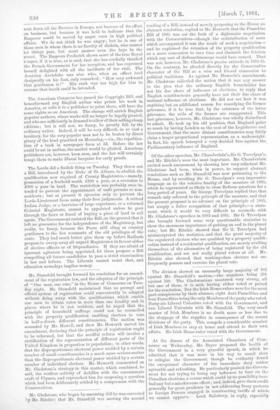Mr. Gladstone, who began by assuming (till he was corrected
by Mr, Ritchie) that Mr, Sta,TheW wee moving the second reading of a Bill, instead of merely proposing to the House an abstract resolution, replied to Mr. Howorth that the Franchise Bill of 1885 was not the fruit of a diplomatic negotiation with the Conservatives—though the redistribution of seats which accompanied it was the result of such a negotiation— and he explained the retention of the property qualification, as a mere concession to save time and diminish the friction which any sort of disfranchisement would have caused. That was not, however, Mr. Gladstone's precise attitude in 1884.85. On the contrary, ho pleaded directly for the Conservative character of the Bill as a wise and liberal concession to political traditions. As against Mr. Howorth's amendment,. Mr. Gladstone ridiculed the notion that it was any answer to the plea that the ordinary English householder has not his duo share of influence at elections, to reply that English constituencies generally have not their due share of national influence at elections. He did not see how it was anything but an additional reason for remedying the former grievance, if it be true that, by the existence of the latter grievance, the evils of the former are exaggerated. This last grievance, however, Mr. Gladstone was wholly disinclined to admit. He took up his old position, that England gains, so much by having London as the seat of the Legislature and Government, that the more distant constituencies may fairly claim a larger proportional representation as a makeweight. In fact, his speech betrayed a very decided bias against the
Parliamentary influence of England. '






































 Previous page
Previous page